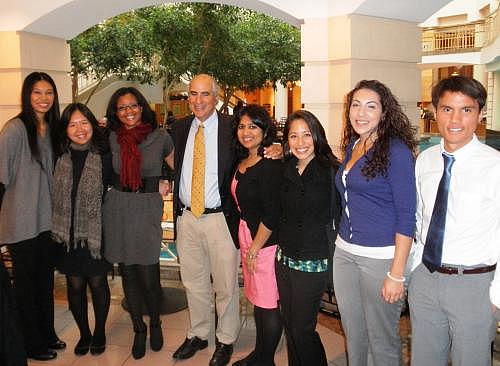Award-winning program trains next generation of diverse health professionals

Jeff Oxendine recalls feeling like a “floundering” student at California State University, Chico. “I was a PE major, because I didn’t know anything other than playing sports, and I didn’t really know what I wanted to do,” Oxendine said.
His mother sent him a list of “hot careers,” he remembers, and he was intrigued by the field of health administration. He ended up switching majors and pursing an internship in health administration. The internship, he said, provided him with “first hand experience that made me realize I really wanted to go into this field. It was possible for me to do it, and I had some potential in it.”
The internship also connected him with mentors, who wrote him letters of recommendation when he applied to the UC Berkeley School of Public Health. He also landed a job out of the internship. “I think I was more competitive (for graduate school) because I had internship experience,” said Oxendine, who today is the school’s associate dean of public health practice. “It helped me be clear about what I wanted to do. For me, that really changed everything.”
Years later, Oxendine created an internship program like the one that changed his life. He’s now the founder and president of Oakland-based Health Career Connection, which helps prepare the next generation of talented, diverse health leaders and professionals by connecting them to internships, mentors and health professions schools. He recently won a 2013 James Irvine Foundation Leadership Award for his work.
Today, as communities across the nation face a looming doctor shortage -- which will be exacerbated by the expansion of health insurance under the Affordable Care Act and an aging health workforce -- Health Career Connection provides a real solution, Oxendine said. The program, he said, helps resolve some of the challenges of growing a diverse workforce: It breaks down academic barriers, exposes students to a wider range of health career options, supports them in applying to graduate school, and provides them with role models and mentors in the health field.
“What Health Career Connection tries to do, is help individuals discover and realize their full potential, hopefully in a health career,” Oxendine said. “Secondly, it connects these talented, diverse students to health profession schools that are seeking them, and prepares the next generation of diverse health leaders and processionals, particularly people who want to give back and serve in the communities where they are from.”
The program provides a proven model: It has been implemented in four regions across California, and replicated in New England, North Carolina, and the New York/New Jersey area. He’s looking to expand to Washington, D.C. soon, and to Chicago and Philadelphia next. The 23-year-old program has provided more than 1,400 students with paid, summer internships, most in the past 10 years. Last year, about 70 percent of the program's 212 interns were offered jobs by their host organization, or their internships were extended.
“The model does work, and the model is the same in each of our areas,” he said.
Oxendine is a Lumbee Indian, and he said his heritage has inspired much of this work. His background made him eligible for that original internship program, he said, and drives his passion for improving the health of minority, low-income, and under-served populations. He’s thrilled that Health Career Connection’s regional program in North Carolina is working with the North Carolina American Indian Health Board to increase opportunities for American Indian students to access health internships and careers.
In my next post, I’ll feature a few of the students across the country who have benefitted from opportunities through Health Career Connection.
Image from Health Career Connection

